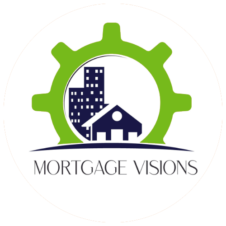
As a newcomer to Canada, how can you start building a decent credit score from scratch? 5 tips on how can you start building a decent credit score from scratch
In Canada, having a credit rating or credit score is required for survival. A good credit score can help you qualify for a better mortgage and other loan interest rates in the future. Having and using a credit card is necessary to begin building your credit history.
Nous, à mortgage visions will try to explain what a credit score is, give you some helpful hints on how to develop a solid credit history as a newbie to Canada, and show you how to check your credit score and order a credit report in this post.
Credit Score
Certain information is shared with a credit bureau when you borrow money from a bank (or lender). Additional information will be shared with the credit bureau over time, such as whether you’ve paid your bills on time, whether you’ve missed payments, and how much debt you owe. These criteria are used to calculate your credit score, which is a three-digit figure that tells lenders how likely you are to repay a loan, as stated on your credit report.
The lower the risk to the bank, the higher your score, and vice versa. With a credit score of less than 750, it will be more difficult to obtain loans or credit cards; you may be given a reduced credit limit and charged higher interest rates. Most banks offer a credit card to newcomers to Canada when they create a newcomer account with them, and this is usually enough to get you started on your path to creating a strong credit history in Canada and if you are planning to purchase your first home in Canada you need a good credit score.
5 ways to improve your credit score
1. Make on-time payments and pay off your entire balance each month.
When lenders look at your credit record and ask to check your credit score, they want to know how dependable you are when it comes to paying your obligations, because past payment history is usually a solid indicator of future performance. It’s critical to make all of your payments on time if you want to establish a strong credit history. While your credit card account will always show the minimal amount outstanding, it’s ideal to pay off the balance in full each billing cycle if you’re just getting started with developing credit in Canada. You may avoid credit card debt by paying off your entire bill each month.
2. Keep the number of credit applications and/or credit checks to a minimum.
It’s natural and expected that you’ll seek credit as you settle into your new life in Canada. A lender or other credit-based product provider may request that you “check your credit” or “get your report.” They are requesting access to your credit record at the credit bureau when they do so. An inquiry is made on your credit report as a result of this.
To limit the number of credit checks on your report, do the following:
Limit the number of times you apply for credit; gather estimates from multiple lenders within two weeks while looking for a car or a mortgage. To calculate your credit score, your queries will be merged and considered as a single query.
Only apply for credit when you truly require it.
3. Make good use of credit.
Always keep your credit limit in mind. If you have a credit card with a limit of $2,000, try not to go over it. You should only spend what you can afford to repay. Using a credit card to spend more over the limit can damage your credit score.
Try to use less than 35% of your overall credit per billing cycle as a rule of thumb. This covers all of your credit products, such as a line of credit, a credit card issued by a Canadian bank or lender, and loans. If you have a $2,000 credit card and a $5,000 bank line of credit, for example, you should keep your total spending to around $2,450 (35 percent of 7,000) or less, while also sticking to the 35 percent guideline (in this case, $700) for your credit card.
4. Any errors on your credit report should be reported.
When you receive your report, look for the following things:
- Credit card and loan account errors, such as a payment you completed on time that is listed as late — this might hurt your credit score;
- Inaccuracies in your personal information, such as an inaccurate mailing address or birth date;
- Accounts that you never opened are listed, which could indicate identity theft.
- Negative information about your accounts that has remained on your report for the maximum number of years allowed.
5. Use a variety of credit options, such as a credit card, a loan, or a line of credit.
Your credit score is affected by the number of credit products you have (such as a credit card, line of credit, loans, and so on). It is advisable for newcomers to Canada to start with a single credit card and then apply for other credit products afterward. Diversifying your credit and having a mix of credit products may help you enhance your credit score as you establish yourself in Canada. However, make sure you can repay whatever money you borrow; otherwise, taking on too much debt could harm your credit score.
You should check out our other readings:

Commentaires récents